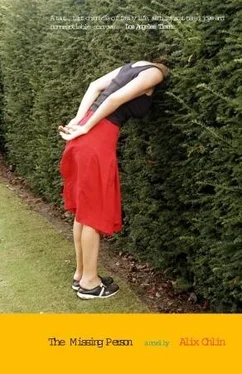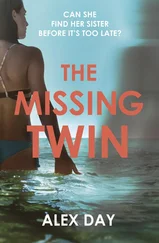“I think it’s going well, don’t you?” my mother said.
I poured myself another hefty glass of wine. “Are you out of your mind?”
“No, I don’t believe I am. And I’ll thank you not to speak to me in that fashion.”
“Sorry,” I said. “But seriously, Mom, what were you thinking? Can’t we just have one night, the three of us? I finally get Wylie to come home, and this is what you do?”
“David is part of my life now, and you children have to accept that.”
“So’s David’s wife, and you didn’t invite her.”
She kept her back to me, tasting something with her finger.
I considered repeating myself, in case she hadn’t heard me, then thought better of it and headed back to the living room, where a troublesome silence had taken over.
Wylie was sitting with his head practically between his knees, clutching himself for dear life.
David looked up at me with an expression of concern, placed a hand on Wylie’s back, and said, “He’s not feeling very well, I don’t think.”
I saw a shudder run down my brother’s spine.
“I’m fine,” Wylie muttered from between his knees.
“Maybe you should lie down or something,” Donny said.
“I think dinner’s almost ready,” I offered helpfully.
“I’m fine,” Wylie said again, and uncurled his head. “Just a little nauseous.”
“It’s probably all those snacks,” I said.
“No,” he said, “it isn’t.”
We sat there sipping disconsolately from our drinks until my mother announced that dinner was served. There were linen napkins on the table and the good china we once used only at Christmas. For a second the world slipped, loosened around its edges, and I was standing in the past: the smell and heat of candles, the white tablecloth with green trim, my father’s face flushed as he lifted his chin and laughed at something Wylie or I said. All of this — this present day — seemed imaginary and flimsy compared to that memory; it shocked me to think that he was dead and the rest of us, here in my mother’s house, were still alive. Then I sat down.
“Let us pray,” David said. His sons bowed their heads, as did my mother. Wylie and I looked at each other across the table.
“Dear God,” David went on. His voice was relaxed and familiar, as if God were a neighbor with whom he was accustomed to discussing baseball or the weather. “When we sit down in a lovely home with a lovely meal prepared by a lovely woman, in the company of family and friends, we remember to be grateful to you, Lord, and take it as a sign of your continuing and blessed grace which you bestow upon us every day, and we thank you for it. Amen.”
“Amen,” said everybody except me and Wylie.
Across the table, Darren winked at me and said, “Good grub, good meat — thanks, God, let’s eat.”
We were served a fine and complicated meal involving pork tenderloin and braised vegetables and sauces and sides, and I would have eaten a lot had I not spent the entire day emptying the kitchen cupboards. Instead I drank several more glasses of red wine and picked at my food. Fortunately, the Michaelsons were there to pick up the slack, and their appetites were substantial. Wylie, to my amazement, continued to eat without stopping, methodically clearing one helping and serving himself another, as if he were a camel or some other animal capable of storing enough food to last through the lean weeks to come. Seated at the head of the table, our mother poured wine and proposed toasts: to summer, to children reunited with their parents, to old neighbors, et cetera. From the other end of the table David toasted her back, the wet hem of his mustache glinting in the candlelight. Outside, the red sun glowered low in the sky, the horizon soupy and green, the world colored like an infection. We ate.
The first half hour passed without incident. Our mother told stories about the travel industry, describing the outrageously false claims made by fleabag hotels charging luxury prices and the insufferable demands of cheapskate clients who wanted to tour the world for the price of a bus ticket to El Paso. Even Wylie laughed. David asked me how my studies were going, and his boys leaned forward to hear my answer.
“I’m working on my dissertation, I guess.”
“You must be smart,” said Donny.
“Of course she’s smart,” David said. “You know, Lynn, I love art. Whenever I’m in a foreign city, the first place I go is the museum.”
“Really,” I said. I assumed my mother had told him to say this.
“Lynn’s loved paintings since she was a little kid,” Wylie said. “She used to just stand there and stare at them, like she was sleepwalking or something. You could talk to her and she wouldn’t even hear you.”
“You loved paintings when you were a kid?” Darren said.
“When I was a kid,” Donny said, “I loved baseball and, I don’t know, making fun of girls.”
“Some things never change,” Darren said philosophically, then elbowed his brother, and they both laughed.
David wiped his mustache delicately with his napkin and patted his belly as though complimenting it on a job well done.
Meanwhile Donny, Darren, and Wylie all used pieces of bread to clear their plates of any last vestiges and sat back with an air of regretful finality.
Donny grinned at Wylie across the table. “For a skinny guy, you can put a lot away.”
“It’s probably his first square meal in weeks,” our mother said.
“If I don’t eat real regular, I get irritable and off-balance,” Donny volunteered.
“Now that makes sense,” she said, looking at Wylie.
“I feel good now,” Wylie told her quietly.
“I’m sure glad to hear it,” David said. “You were giving your mother quite a scare.”
“Was I?” Wylie said.
“Now, son, you know you were. Running around with all those—” here he paused, and smoothed his mustache with his right index finger—“antisocial types.”
I watched Wylie smile at this, first gently and then widely.
“Those antisocial types,” he said quietly, “are good people doing important work, and they’re my best friends.”
“Those people are spoiled brats and trust-fund babies. I’ll bet you dollars to donuts that they’re living off their parents while they run around thinking they’re righteous because they spike trees.”
“You don’t know that they spike trees,” I said. “You don’t know anything about them.”
“You’d be surprised what I know,” David told me. “I know it’s not all fun and games and some big party like you kids think it is.” His lips were sputtering beneath his mustache. “I know that there are serious issues at stake.”
“Like hell you do,” I said. I was drunk.
At the end of the table, my mother covered her face with her hands. “Why are you defending those people?”
“Why shouldn’t she defend them?” Wylie said.
“Now, listen, young lady,” David said. “I’m as environmentally sensitive as the next person—”
“Sure you are, when the next person’s a toad killer,” Wylie said.
“What’s that mean?” Donny said, and Darren shifted in his seat.
“Toad killer,” Wylie said slowly. He was still smiling, his jaw clenched, and the words issued from between his teeth in a whisper. He stood up. In the flickering candlelight his smile shimmered with rage. “As in one who kills toads just for the fun of it.”
“Sit down,” our mother said. He ignored her. Across from me, Darren wiped a finger over his plate and licked off some final morsel. His father rose heavily to his feet and held up his palms in what I guessed he thought was a soothing gesture. But it had the opposite effect, and Wylie whirled on our mother and said, “You don’t understand anything.” I said his name, and he looked at me and shook his head, then ran out of the house in his clean, bare, callused feet.
Читать дальше












